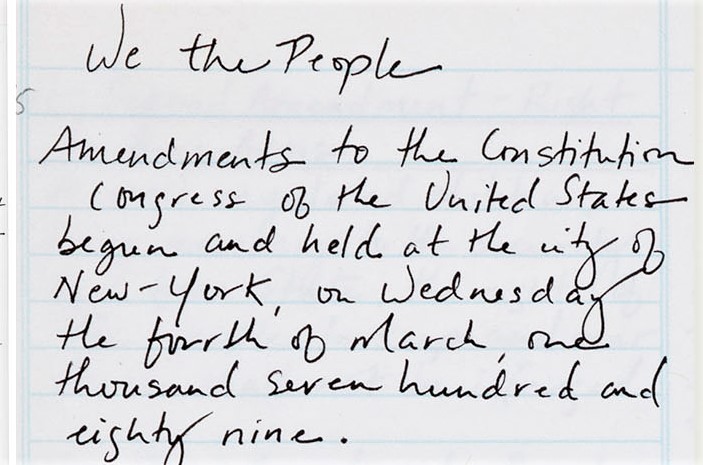Have you ever tried handwriting the entire text of the U.S. Constitution?

“On Inauguration Day, [artist Morgan O’Hara] went to the [New York Public] library with a small suitcase of pens, a few Sharpies, papers and copies of the Constitution. I brought old notebooks, half-used drawing pads and loose sheets to share with anyone who might show up. I began writing. …
“Hand copying a document,” O’Hara observes (July 3), “can produce an intimate connection to the text and its meaning. The handwriter may discover things about this document that they never knew, a passage that challenges or moves them. They may even leave with a deeper connection to the founders and the country, or even a sense of encouragement.”
While I handwrite notes, from grocery lists to conversation notes, handwriting even part of the Constitution seems a bit daunting to me.
However, this past Sunday, The New York Times produced a special section, “An Annotated Constitution,” (print, only). With a notable introduction by historian Garry Wills, I reconnected with the intent, urgency, and confidence of a promising young country collaborating with how they wished to “form a more perfect Union, establish Justice, insure domestic Tranquility, provide for the common defense, promote the general Welfare, and secure the Blessings of Liberty to ourselves and our Posterity…”
The annotations are offered by a variety of contributors: from Senator Bernie Sanders to Senator Mike Lee; from former U.S. Assistant Attorney General John Dunne to Harvard Professor Laurence Tribe. Even late-night comedian, Stephen Colbert contributed this thought:
“While the Constitution describes the form and function of the government (what it does and how we participate in it), the Bill of Rights is mostly a list of things that the government can’t do to us. It’s the purest expression of Americans’ longstanding and reasonable paranoia of power. … ‘Higher power, thou shalt not tread on me.’ ”
One stand-out for me is the First Amendment:
“Congress shall make no law respecting an establishment of religion, or prohibiting the free exercise thereof; or abridging the freedom of speech, or of the press; or the right of the people peaceably to assemble, and to petition the Government for a redress of grievances.”
While some legal scholars hold that Free Speech only protects political speech, nonetheless, you can’t shout fire in a crowded theater.
Actually, the original quote comes from Supreme Court Justice Oliver Wendell Holmes Jr.’s written opinion, Schenck v. Unites States. In a unanimous opinion, the Supreme Court held that “The most stringent protection of free speech would not protect a man falsely shouting fire in a theater and causing a panic. […] The question in every case is whether the words used are used in such circumstances and are of such a nature as to create a clear and present danger that they will bring about the substantive evils that Congress has a right to prevent,” Holmes wrote.
According to a footnoted entry in Wikipedia, “People have indeed falsely shouted ‘Fire!’ in crowded public venues and caused panics on numerous occasions, such as at the Royal Surrey Gardens Music Hall of London in 1856, a theater in New York’s Harlem neighborhood in 1884, and in the Italian Hall disaster of 1913, which left 73 dead.”
What do we stand for, as a country?
The Constitution and Bill of Rights enumerate what “We, the people” believe in, but something more; something that can be found when we read between the lines of those documents through the optics of history — from individual rights to Civil Rights, women’s rights to Gay rights — we have a corresponding responsibility to treat others with honesty, respect, decency, tolerance and fairness.
While we may disagree about the details on issues, the thing that distinguishes us as Americans is that we endeavor to “hold these truths to be self-evident: that all men are created equal; that they are endowed by their Creator with certain unalienable rights; that among these are life, liberty, and the pursuit of happiness.”
And when we face the harsh realities of dissent, as we have in the past and will continue to do so in the future, “We must,” as former New York Governor Mario Cuomo said, “get the American public to look past the glitter, beyond the showmanship, to the reality, the hard substance of things. And we’ll do it not so much with speeches that will bring people to their feet as with speeches that bring people to their senses.”
If we wish to succeed as a country, we must come together as Americans first, recognizing that we are bound together not only of a country of ideals but a set of principles that remind us that we can always do better.
Comments









